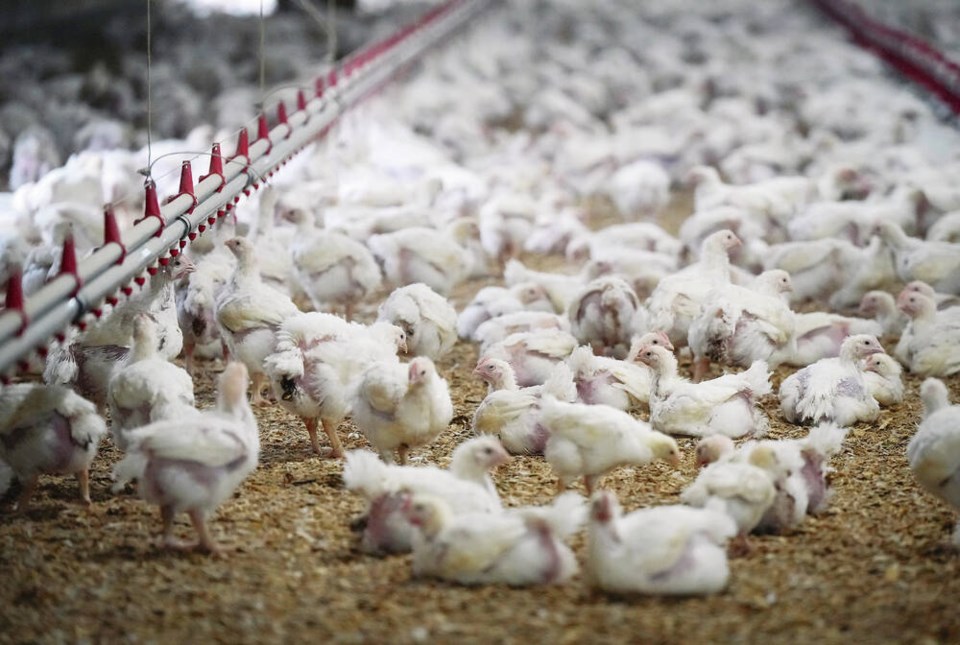The province’s turkey producers aren’t anticipating any shortages of the big birds for Christmas dinners this year — despite rising cases of avian flu that have decimated some flocks in the Lower Mainland.
Island poultry and egg producers, meanwhile, are knocking on wood that the deadly influenza spread by migrating wild birds won’t affect any major flocks here.
Jennifer Woike, who runs Farmer Ben’s Eggs in the Cowichan Valley with her husband, Ian, said they’ve implemented strict protocols on their farm to prevent the spread of the H5N1 avian flu, adding there shoudn’t be any shortages of eggs for breakfasts or the Christmas baking season.
Canadian Food Inspection Agency data show there have been 39 outbreaks of H5N1 avian flu in the province since Oct. 20, resulting in about five million birds dying of infection or being “humanely depopulated” to halt the spread of the virus.
The agency said 34 farms had been infected in B.C. this month — 33 of them commercial poultry operations in the Fraser Valley.
“It’s something nobody wants to happen because it could be devastating,” Woike said in an interview on Wednesday.
The Woikes produce about 21 million eggs a year from 65,000 laying hens, and have another 30,000 replacements on hand at any given time.
The virus is spread through the feces of wild birds as migrating flocks of geese fly over poultry farms or land in surrounding ponds and other bodies of water. The threat of transfer to domestic flocks is constant.
Before even entering one of their barns, the Woikes go into change rooms to switch out their footwear, don disposable body suits and hairnets, and wash their hands. All vehicles entering the farm have to be inspected and their tires washed.
Jennifer Woike said bio-security measures are “the new normal” on poultry farms in the province, where farmers already struggling with rising feed, fuel and power costs now have to lay out more money for protective measures.
And there is fatigue, she said, both emotionally and physically as owners and employers struggle with the day-to-day threat of infections on the farm, and their own health.
“We used to have a lot of tours with students and culinary schools to show people where their food comes from, but with the infections the way they’re going, we’ve had to step away from those now,” said Woike. “It’s really tough on everyone. There’s an extra layer of stressors to deal with.”
British Columbia Turkey, which represents 50 major commercial farms in the province — including five on Vancouver Island — said there have been six major culls of infected turkeys since October, resulting in the deaths of about 190,000 of the big birds.
Executive director Natalie Veles said the farms produce about two million turkeys a year — with Christmas representing about half the production.
She doesn’t anticipate any turkey shortages this festive season, however, because the farms have imposed strict bio-security measures and fewer farms have had to cull flocks than last year.
Amanda Brittain, chief information officer for the B.C. Poultry Association, said if the outbreaks worsen, there are agreements in place with other provinces to make up any shortfalls in poultry products.
Woike said only 6% of the province’s poultry operations have been hit with avian flu, which is much lower than in previous years, “so it’s not panic time for getting your eggs, turkeys and chickens. It shows we’re doing something right.”
“We’ve been pretty fortunate over the years on the Island,” added Woike. “There’s some benefit for us being spread out and not so close together like all the farms in the Fraser Valley.”
But she is worried about smaller flocks that could contract the virus and spread it to larger operations.
“It’s just not safe having birds outside anymore,” she said.
Dianne Williamson of Firbank Farm in Central Saanich, one of the Island’s largest poultry and egg producers, is expecting a load of 30,000 chicks from the mainland this week.
The chicks have cleared inspection and delivery and strict protocols will be in place for handling of the birds, a strategy that has kept Firbank free of outbreaks over the years.
“So far, so good,” Williamson said.
Meanwhile, provincial health officer Bonnie Henry this month urged poultry workers to get their flu shots, since there is concern that a rare human infection with avian flu could cause the virus to mix with human influenza and mutate into something more contagious among people.
Such a development has long been feared among scientists worried about where the next pandemic illness will come from.
— With a file from The Canadian Press



